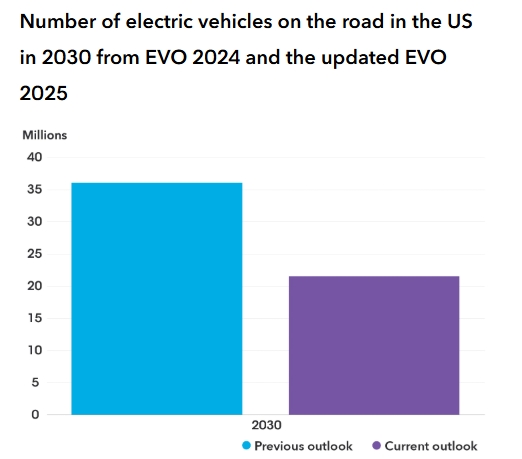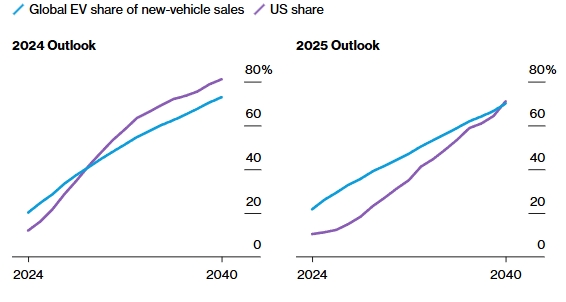TradingKey - U.S. President Donald Trump’s preference for traditional energy industries and ambivalent stance toward new energy sectors — including electric vehicles (EVs) — is evident. His administration's policies, such as the rollback of EV subsidies and weakening of state-level emissions standards, are raising concerns about the future of the U.S. EV market.
A recent report from BloombergNEF (BNEF) titled Electric Vehicle Outlook 2025, published on June 18, shows that while global EV sales continue to rise — expected to account for nearly one-quarter of total auto sales in 2025 — the U.S. is falling behind, with China dominating growth and poised to surpass the entire U.S. car market in volume by next year.
U.S. Policy Headwinds Slow EV Growth
The report highlights how the rollback or threat of removing key provisions from the Inflation Reduction Act (IRA) — which previously supported EV adoption — along with moves to strip California’s authority to set its own emissions standards, have prompted BNEF to downgrade both near-term and long-term U.S. EV outlooks.
BNEF now forecasts a cumulative reduction of 14 million EV sales in the U.S. by 2030, compared to earlier projections.

Source: BloombergNEF
Unlike previous forecasts that predicted U.S. EV adoption would surpass the global average starting in 2029, the latest report warns that the U.S. will lag behind global averages — especially China and Europe — well into 2040.

Source: Bloomberg
China Leads the Charge
According to BNEF, China’s EV market continues to benefit from strong government incentives and has become a global manufacturing powerhouse in the sector.
In contrast, the U.S. policy reversal is seen as a major setback for domestic EV demand and infrastructure development.
For reference, in the 2024 Outlook, U.S. EV adoption was projected to rise from 10.1% in 2023 to 47.5% by 2030. The 2025 Outlook now projects EV penetration in the U.S. to reach only around 27% by 2030.
This represents a dramatic downward revision in expectations, signaling a potential loss of momentum in the U.S. transition to electrification.
Market Response Reflects Uncertainty
Since the start of 2025, leading EV stocks and ETFs have been volatile:
- Tesla (TSLA) share price has swung widely amid uncertainty, with a loss of 21.66% YTD
- The Global X Autonomous & Electric Vehicles ETF (DRIV) has fallen 2.44% YTD
- The KraneShares Electric Vehicles and Future Mobility ETF (KARS) has gained around 1%
- The SPDR S&P Kensho Smart Mobility ETF (HAIL) has also edged up about 1%
All of these underperformed the S&P 500’s 1.72% gain this year.
Find out more